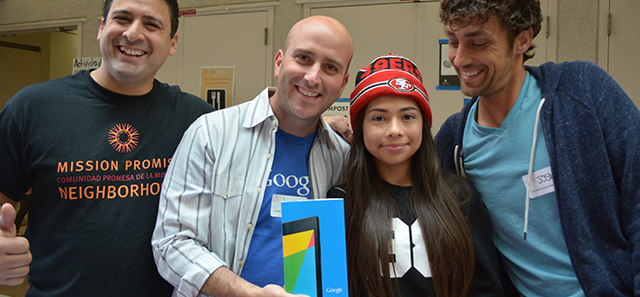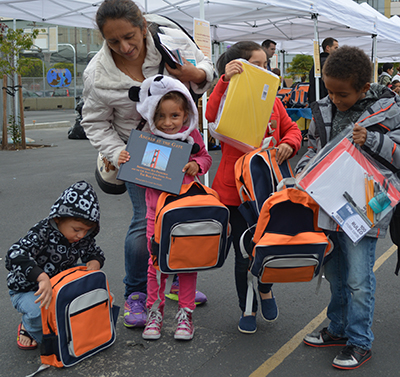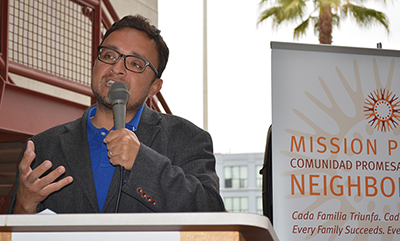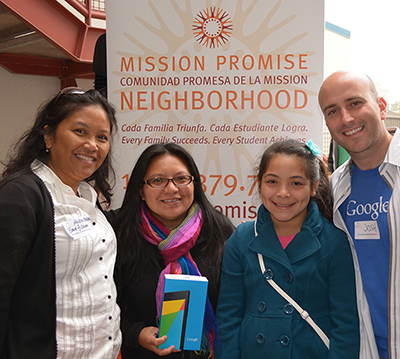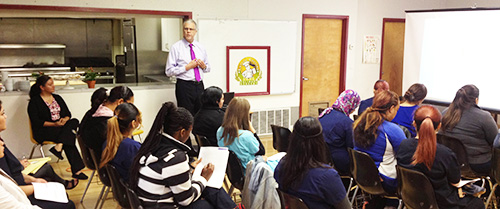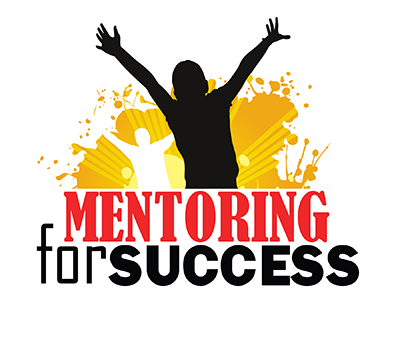 Dolores Terrazas speaks with pride of her dedicated staff of 90 that has made Mission Head Start a mainstay for San Francisco’s Latino community for over 40 years, myriad young lives positively affected over that time.
Dolores Terrazas speaks with pride of her dedicated staff of 90 that has made Mission Head Start a mainstay for San Francisco’s Latino community for over 40 years, myriad young lives positively affected over that time.
 “I enjoy the wonder of experiences of children who have a voice,” profoundly exclaims the Mission native, whose career has showcased a well-honed focus on early education. “I see Mission Head Start as a catalyst for a child’s success.”
“I enjoy the wonder of experiences of children who have a voice,” profoundly exclaims the Mission native, whose career has showcased a well-honed focus on early education. “I see Mission Head Start as a catalyst for a child’s success.”
So started an hour-long interview with the engrossing, two-year Division Director, Children Services–a visionary of a nonprofit that serves as a vital partner of the Mission Promise Neighborhood. Located at 362 Capp Street, just a stone’s throw away from MEDA’s Plaza Adelante, Mission Head Start/Early Head Start is part of Mission Neighborhood Centers (MNC). Executive Directive Santiago “Sam” Ruiz spearheads the work of the organization.
MNC offers its services to a trio of vulnerable age groups: zero to five; youths; and seniors. Mission Head Start’s vital services–offered to an under-resourced, mostly Latino clientele–are offered at ten facilities, seven of which are located in the Mission zip code of 94110 and all of which offer bilingual staff. Despite a recent demographic shift, with Latinos compelled to move from the ever-pricey Mission, many of the agency’s 400+ clients come back out of familiarity (48 of these 400+ are part of a recent surge in clients).
Liz Cortez, MEDA’s Early Learning Manager, knows all too well the important work of MNC. She explains the need as follows: “Mission Neighborhood Center-Head Start is a critical partner for MPN. They offer early care and education services to the majority of families with young children in the Mission. They are on the frontline, working every day to assure that every child in their care enters school ready to learn.”
The long-term vision of Mission Head Start recently overcame a major obstacle, as grantee San Francisco State University was no longer in the picture. This lead to Mission Head Start having to apply for the grant on its own—a new experience.
The great news? A five-year, federal grant was successfully garnered by the agency, for reasons ranging from excellent grant writers and systems being in place to innovation and long-term staff. (Half of Mission Head Start’s staff has been intact for over a decade, rare in a world where job skipping seems to have become the norm.)
With the organization’s eyes on the prize, September is seeing the advent of new programs to further better the trajectory of school readiness. One novel program will include home-based services that will be coupled with the already-existing hub services, the latter to ensure a proper socialization experience still occurs.
Continues MEDA’s Cortez, “I’m very excited about the new Early Head Start home-based model. It will offer families with infants and toddlers ideas for how to turn their home into a learning environment and, more importantly, it will promote the parent as the child’s first teacher. It will also connect families that are not connected to formal care with other families through socialization experiences. This will mutually benefit the children and the families.”
Also innovative is a new “push-in model,” whereby a therapist from the San Francisco Unified School District (SFUSD) will be housed at Mission Head Start’s main facility to provide therapeutic services for children. This centralized therapeutic experience often took parents and children on buses across town. Those days are over, much to the relief of the community’s families.
“Working with SFUSD is integral to success. Half of our children transition to kindergarten in any given year,” explains Terrazas. “Mission Head Start offers family field trips to elementary schools and workshops on kindergarten readiness. All are key to success.”
Success comes almost daily, with full-time enrollment from 8am-5:30pm for 246 days a year. Part-time is offered for half a day for 128 days. Eligibility is based on federal poverty guidelines, with the parent needing to be employed or attending school for their child to be eligible for full-time enrollment. Filling a need for having children in a welcoming atmosphere provides emotional support that is paramount to logistical support.
Exemplifying the need in the community was the story of Carmen. She brought a number of her eight children to Mission Head Start over the years. At first, the client barely mouthed, “Hola” when dropping off and picking up her children. Staff knew they would have to work hard at gaining Carmen’s trust. Being from a high-needs family, the challenge was great. The Mission Head Start staff was not daunted by the challenge.
With nurturing and compassion, the benefit has been reaped: Carmen now engages with staff, realizing that the site supervisor never judged her. Carmen not only feels supported at the center; she also feels supported by school staff. Success has been achieved on many levels.
With hundreds of other Carmens to serve, the team at Mission Head Start is always ready for a new day, prepared to meet any challenges they may face as they help the Mission community however possible.

